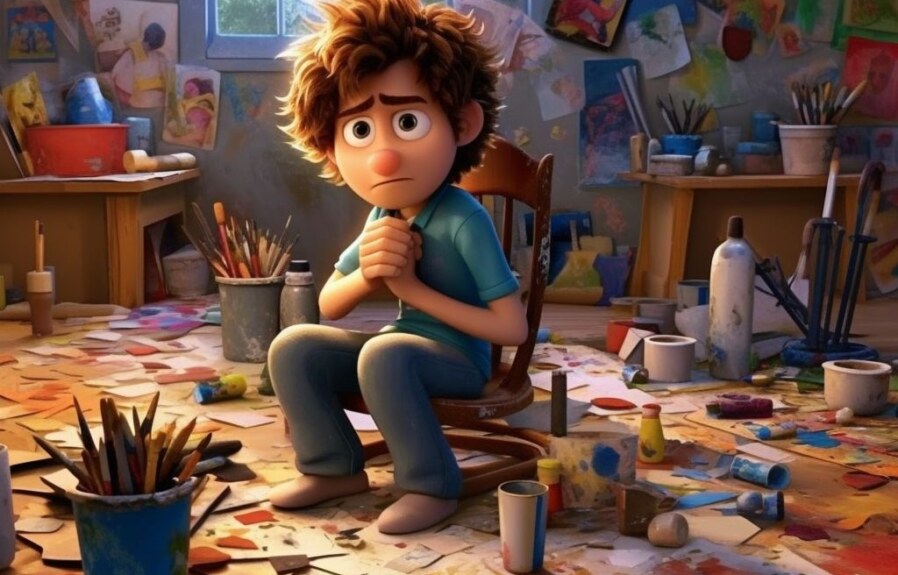Breaking up with someone you once loved or cared about can be a deeply painful experience. It’s never easy, but it’s more toilsome when you find yourself struggling to move on. Getting over a girl can be a complex process, and it’s natural to have mixed feelings of sadness, anger, or resentment.
Whether the relationship was serious or casual, the pain of losing someone can linger for weeks, months, or even years. It’s critical to understand that getting over a girl requires self-care, time, and a solid plan of action.
In this article, we’ll take a comprehensive look at some proven strategies that can help you move on from a girl and start building a new life that’s free from regrets, heartache, and emotional stress. We believe that this guide will be valuable for anyone who’s finding it hard to move on from a failed relationship and is ready to begin a new chapter in their life. So, let’s dive in!
1. Understanding Your Emotions: The First Step to Getting Over a Girl
One of the most challenging parts of a breakup is dealing with the emotional aftermath. Heartbreak can be a rollercoaster of feelings, from anger and frustration to sadness and despair. Many guys struggle to get over a girl because they don’t fully understand their emotions.
To move on and let go of a relationship, it’s crucial to take the time to understand your feelings and identify what’s going on inside. This will help you process your emotions in a healthier way and prevent them from overwhelming you.
One way to start understanding your emotions is to give yourself space to feel them. Don’t suppress or ignore your feelings, but allow yourself to experience them fully. Whether you need to cry, scream, or vent to a friend, it’s important to release your emotions in a healthy way.
Another helpful practice is journaling your thoughts and feelings. Putting pen to paper can help you identify patterns and triggers in your emotions, as well as track your progress as you move through the healing process.
Overall, the first step to getting over a girl is often the most difficult, but it’s also the most important. By taking the time to understand and process your emotions, you’ll be better equipped to move forward and let go of the past.
2. Cut off Contact: Why It’s Important for Moving On
Cutting off contact with your ex-girlfriend is an essential step in the process of moving on. Even if you hope to remain friends in the future, a period of separation is necessary to allow yourself to heal and move forward. In this section, we’ll explore why it’s important to cut off contact and how to do it effectively.
Why Cutting Off Contact is Necessary
Continuing to communicate with your ex-girlfriend can impede your ability to heal and move on. It may reignite feelings of attachment or prevent you from processing the breakup. Seeing photos or posts of your ex on social media can also trigger negative emotions, such as jealousy or sadness. Additionally, staying in contact can make it difficult to establish healthy boundaries and can prolong the pain of the breakup.
How to Cut Off Contact Effectively
Cutting off contact doesn’t have to be a dramatic or hurtful process. It can be done respectfully and kindly. Consider sending your ex a message or having a conversation explaining that you need space and time to heal. Be clear about your boundaries and don’t communicate with them until you feel ready to do so. It’s essential to unfollow or unfriend them on social media to avoid triggering negative emotions. If you share mutual friends, it might be helpful to consider taking a break from group activities that your ex will attend. Remember that cutting off contact is about self-care and self-love, not about punishing your ex or avoiding responsibility for your role in the relationship’s end.
Cutting off contact can be challenging, but it’s necessary for moving on and healing. The space that separation provides can help you process the end of the relationship and begin to focus on your own healing. Make sure to take care of yourself during this time, and reach out to friends, family, or a professional therapist if you need support. Remember that healing takes time, and cutting off contact is just one piece of the puzzle.
3. Stop Blaming Yourself: How to Let Go of Guilt and Shame
Blaming ourselves for a failed relationship is a common response but it can be harmful to our mental and emotional health. Guilt and shame can lead to self-destructive behavior and prevent us from moving on. Here are some tips on how to let go of guilt and shame and focus on healing.
Don’t Play the Blame Game
It’s easy to get trapped in blaming yourself for the breakup. However, it takes two people to make a relationship work, and it also takes two to break it. Accept that the relationship ended because it wasn’t the right fit for both of you. Forgiving yourself and your ex-partner for any mistakes made along the way is a crucial first step in moving on.
Let Go of What You Can’t Control
It’s natural to want to hold on to the past and wonder what could have been. However, this line of thinking will only make you feel worse. Instead of dwelling on the past, focus your energy on things that are within your control. Start by taking care of yourself – practice self-care, spend time with friends, and do things that bring you joy. As you focus on what you can control and take steps to improve your wellbeing, you’ll start to feel better about yourself and the situation.
Practice Positive Self-Talk
Negative self-talk is one of the leading causes of guilt and shame. It’s essential to recognize when you’re engaging in negative self-talk and replace it with positive affirmations. Recognize your strengths and accomplishments and remind yourself that you’re worthy of love and happiness. Over time, you’ll start to believe these positive affirmations and feel confident in your ability to move on from the breakup.
Remember, letting go of guilt and shame takes time and effort. However, with these tips, you can let go of blame and start to focus on healing and moving on.
4. Keeping Yourself Busy: Positive Distractions to Help You Heal
After a breakup, it’s important to keep your mind occupied and your body active. This will not only help you heal faster but will also prevent you from thinking too much about your ex-girlfriend. Here are some positive distractions that you can use to keep yourself busy:
1. Take up a New Hobby
One way to distract yourself after a breakup is to take up a new hobby. This could be anything from learning a new language to trying out a new sport. It doesn’t matter what you choose as long as it’s something that you’ve always wanted to do or that you find interesting.
2. Spend Time with Friends
Another great way to keep yourself busy is to spend time with friends. Get together with your buddies and plan fun activities like going on a road trip, trying out a new restaurant, or watching a game. Surrounding yourself with people who love and support you is a great way to boost your mood and help you move on from the breakup.
3. Focus on Self-Care
After a breakup, it’s important to take care of yourself both physically and emotionally. This means getting enough sleep, eating healthy, and taking time to relax and unwind. You could try practicing meditation, yoga, or taking long walks in nature. Whatever you choose, make sure it’s something that makes you feel good and helps you relax.
Using these positive distractions can help you move on from the relationship and start a new chapter in your life. Remember that healing takes time, and it’s okay to take things slow. With time, patience, and effort, you’ll start to feel better and ready to move forward.
5. The Rebound Trap: Why It’s Best to Avoid Jumping into a New Relationship
Jumping right into a new relationship after a breakup may seem like a good idea to fill the void left by your ex-girlfriend. However, this is not the best way to move on from the relationship. Entering a new relationship before you have fully let go of your past one can be dangerous and lead to emotional damage for both you and your new partner.
Here’s why it’s best to avoid jumping into a new relationship:
1. You Haven’t Healed Yet
It takes time to process and heal from a breakup. If you start dating too soon, you may not have had a chance to work through your emotions or learn from your previous relationship. This can lead to projecting the issues from your past relationship onto your new partner, causing unnecessary complications.
2. You May Repeat the Same Mistakes
Rushing into a new relationship means you may not have taken the time to learn from your past mistakes. Not learning from past relationships can result in making the same mistakes again and potentially causing the new relationship to fail.
3. You May Use the New Relationship as a Distraction
Starting a new relationship too soon can also be a way of distracting yourself from your emotions. It’s important to address and work through these emotions rather than ignoring them. Using a new relationship as a Band-Aid can lead to further emotional turmoil down the line.
Bottom Line: Although a new relationship may seem like a good idea at the time, it’s best to avoid jumping into one right away. Take the time you need to fully heal and learn from your past relationship before moving on romantically.
6. Seeking Professional Help: When to Consider Therapy for Moving On
Sometimes, getting over a girl can be more challenging than expected. For some men, the emotional pain of a breakup can be so overwhelming that it affects their daily routine, productivity, and mental health. If you find yourself stuck in a cycle of negative thoughts and emotions, seeking professional help might be the best option for you.
Signs You Should Seek Therapy
– You’re experiencing severe anxiety, depression, or suicidal thoughts
– You’re struggling to function at home or work because of your emotions
– You’re using alcohol, drugs, or other unhealthy coping mechanisms
– You’re experiencing physical symptoms such as insomnia, weight changes, or fatigue
– You’re unable to maintain healthy relationships with friends and family
If you identify with any of these signs, it’s crucial to seek professional help from a licensed therapist or counselor. Therapy can help you process your emotions, develop healthy coping mechanisms, and identify patterns of behavior that may be contributing to your struggles.
Types of Therapy to Consider
There are several types of therapy that may help you overcome the pain of a breakup. One common approach is cognitive-behavioral therapy (CBT), which focuses on changing negative thought patterns and behaviors. Another approach is acceptance and commitment therapy (ACT), which teaches mindfulness and acceptance techniques to help individuals cope with difficult emotions.
Ultimately, the type of therapy that’s right for you will depend on your individual needs and preferences. It’s essential to find a therapist who specializes in relationship issues and who you feel comfortable opening up to.
If you’re unsure if therapy is right for you, consider taking advantage of a free consultation with a therapist in your area. Many therapists offer initial consultations to help you decide if therapy is the best option for your situation.
Remember, seeking professional help is a sign of strength, not weakness. It takes courage to confront our emotions and work towards healing. If you’re struggling to move on after a breakup, reaching out for help may be the first step towards a happier, healthier future.
7. Learning From the Experience: How to Grow and Move Forward After a Breakup
At the end of a relationship, it’s essential to take the time to reflect and learn from the experience. Doing this can help you better understand what went wrong, what you want in a partner, and how to move forward in a healthy way. Here are some tips to help you grow and move forward after a breakup.
Take Responsibility for Your Part
It’s easy to blame the other person for the relationship’s failure, but it’s important to acknowledge your role in it. Were there things you could have done differently? Did you communicate your needs effectively? Take responsibility for your part in the relationship, and use that knowledge to help you grow in future relationships.
Focus on Self-Improvement
Breakups offer an opportunity for self-improvement. Use this time to focus on your own growth and development. Maybe you want to take up a new hobby, start a fitness routine, or focus on your career. Whatever it is, make sure it’s something that brings you joy and helps you become a better version of yourself.
Keep an Open Mind
It’s natural to feel hesitant about entering into a new relationship after a breakup. Still, it’s essential to keep an open mind. Don’t let the past dictate your future, and don’t be afraid to put yourself out there. Remember that every relationship is different, and there’s always an opportunity to learn and grow from new experiences.
In conclusion, taking the time to reflect on a past relationship is essential to move forward healthily. By taking responsibility for your role in the relationship, focusing on your own self-improvement, and keeping an open mind, you can learn from the experience and grow into a better person.
People Also Ask:
1. How long does it take to get over a girl?
It varies from person to person. Some people get over a girl quickly while others may take months or even years. Give yourself time and focus on self-care to help speed up the process.
2. Should I stay friends with her after a breakup?
It depends on the circumstances of the breakup and your own emotional state. If you can remain friends and it won’t hinder your healing process, then it’s possible. However, if being around her only prolongs your pain, it’s best to cut ties.
3. How do I stop thinking about her?
Try to fill your time with activities, hobbies, and spending time with friends and family. Avoid looking at her social media or pictures, and consider seeking therapy or speaking with a trusted family member or friend to help process your emotions.
4. Can I still love her but move on?
Yes, it’s possible to love someone but recognize that the relationship isn’t healthy or sustainable. Moving on can be difficult but ultimately the best choice for your own well-being.
5. Is rebounding a good idea?
Rebounding can provide temporary distraction, but it’s not necessarily a healthy solution for getting over someone. Take time to heal and focus on self-improvement rather than jumping into a new relationship.
Conclusion:
Getting over a girl can be challenging, but it’s essential for moving forward with your life. Give yourself time and space to grieve the loss of the relationship, and prioritize self-care through activities, therapy, and spending time with supportive people. Remember that healing takes time, but you will come out the other side stronger and ready for new opportunities.



